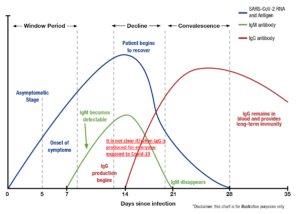INTERVIEW LINK: https://www.facebook.com/drmikikomurakami/videos/1166105563559669/
“IMMUNITY PASSPORT”
On April 24, 2020, the WHO announced in an article titled “Immunity Passports” in the Context of Covid-19 that “there is currently no evidence that people who have recovered from COVID-19 and have antibodies are protected from a second infection.”
This statement by the WHO may create questions, and I’m hoping to clarify Covid-19 testing by reviewing PCR and Covid-19 antibody testing. I will reference two recent articles by Nature Magazine: 1) Will Antibody Tests for Coronavirus Really Change Everything (4/18/2020), 2) The Researchers Taking a Gamble With Antibody Tests for Coronavirus (4/21/2020).
SENSITIVITY AND SPECIFICITY
The Sensitivity of a test refers to the ability of the test to identify disease. If a test yields 90% sensitivity, 90% of the people who have the disease that get tested will be identified.
The Specificity of a test refers to accurately detecting those without the disease being truly negative. If a test has 70% specificity and 100 people with no Covid-19 are tested then 70% will show up negative (and 30%, positive).
PCR
PCR testing is done via nasal swab. The outcome of the nasal swab testing for Covid-19 virus (called SARS-CoV2) has yielded low sensitivity. Even if you tested negative, you still may have had the infection. This is not just due to the actual lab test itself. The timing of the test, and the way the sample is collected is crucial to yielding a better test outcome. Many have not been tested, or been denied testing, at the onset of symptoms. You have to have an active replicating virus and be in the early stage of your disease process for it to show positive. If you get it done many weeks later, you will test negative. There is also room for error in how the nasal swab is done. Experienced hospitalists have stated that it took 3 nasal swabs on 1 patient to yield a positive result. The good news about the test – if you tested positive, you are most likely to be positive.
ANTIBODY TESTING
Antibody testing is a blood test. Antibodies are produced and secreted by the B-cells that live in your bone marrow. Antibodies are produced to a specific antigen, such as a protein fragment of the Covid-19 virus, an alien substance to your body to detect and fight off the virus.
You will be hearing about IgM and IgG. Know the difference.
IgM is created in your body when you first encounter the virus when you just get the disease (4-10 days after infection). Having this shows us that you just got the disease. You can see how combining PCR testing with Antibody testing of IgM would improve the sensitivity of picking up the disease.
IgM disappears as your IgG ramps up. Having IgG will tell us that you had the disease. IgG antibodies are “neutralizing antibodies” that bind to a virus (or bacteria or microbial toxin), preventing further destruction. Scientists do not know enough about Covid-19 to say for certain how long the body takes to develop IgG after the Covid-19 infection.

Image from http://www.diazyme.com/covid-19-antibody-tests
In addition, it is hoped that IgG will create immunity, so the next time you encounter the virus, it will immediately neutralize it. However, it is not clear whether all people exposed to Covid-19 will have detectable neutralizing antibodies. You may have been exposed to Covid-19 once, but the next time you get it, you may not have the IgG you need to combat it the next time.
Recap: we do not know whether all those exposed to Covid-19: 1) will create IgG; 2) how long it will take for the body to make IgG; and 3) even after making IgG, how long the body will continue making IgG to give immunity against secondary exposures to Covid-19. Therefore, we do not know whether IgG will equal immunity. This is not to say that it will not. We are still gathering evidence.
ANTIBODY TESTING
Per my communications with Chief Medical Officer, Dr. Klaus Thaler (Good Samaritan Hospital, Santa Clara County) on April 14, 2020:
Routine COVID-19 antibody testing is not quite ready for standard usage. This is due to several factors such as the qualitative nature of the ELISA test, the lack of understanding how to interpret test results with regard to immunity, preliminary findings that IgM/IgG seems to rise differently than for other viruses, the scarcity of scientific studies.
This is what the WHO actually said in the article titled “Immunity Passports” in the Context of Covid-19 on April 24, 2020:
Laboratory tests that detect antibodies to SARS-CoV-2 in people, including rapid immunodiagnostic tests, need further validation to determine their accuracy and reliability. Inaccurate immunodiagnostic tests may falsely categorize people in two ways. The first is that they may falsely label people who have been infected as negative, and the second is that people who have not been infected are falsely labelled as positive. Both errors have serious consequences and will affect control efforts. These tests also need to accurately distinguish between past infections from SARS-CoV-2 and those caused by the known set of six human coronaviruses. Four of these viruses cause the common cold and circulate widely. The remaining two are the viruses that cause Middle East Respiratory Syndrome and Severe Acute Respiratory Syndrome. People infected by any one of these viruses may produce antibodies that cross-react with antibodies produced in response to infection with SARS-CoV-2.
There are numerous tests floating around, some FDA approved, most not and have not undergone rigorous testing to verify accuracy. A high quality test should achieve 99% or more sensitivity and specificity. Some of the commercial tests are ranging 67-93% sensitivity and 80-100% specificity.
At least 70 companies have created “Covid-19 antibody tests” in the past month, and many practitioners are starting to sell these. Some of the Covid-19 antibody testing are picking up other types of Coronavirus; if you test positive, you may have had a different Coronavirus but think you had Covid-19. The Coronaviruses are a large family of viruses that affect people and animals and some are fairly common, including some cases of common cold. Not all Coronaviruses are Covid-19!
WHAT TO MAKE OF ALL OF THIS

Don’t read the headline of an article and jump to a conclusion.
There are many poorly conducted studies out there, and journalists who summarize these poorly designed studies in a sensationalized way to create hype. It’s like playing Telephone and causing panic at the same time.
The WHO stating “there is currently no evidence” does not mean that something cannot be proven later. Scientists need time. Biology and clinical studies don’t happen overnight.
That being said, don’t get overly excited that immunity will be proven later and start hosting underground raves (Bay Area residents, ah-hem). We cannot assume immunity based on current tests and current scientific data.
Based on the history of the Spanish Flu (1918), once people relaxed and started “acting normal” again, the second and more deadly wave hit. We do not need to repeat this history.
MY OPINION
Any time you get a test, you need to consider what you will do with the result. For the general public, if you had exposure to Covid-19 but have no or minimal symptoms, you are going to be staying at home for at least 14 days. Health care providers have different protocols.
If you get the PCR nasal swab test (now available as a drive-thru in many locations), and you test positive, then likely you have/had Covid-19. If you test negative, you still may have had Covid-19. We also don’t know about your immunity based on this test result. Your plan should not change based on a negative test result, but should encourage you a stricter quarantine, if you are positive.
As for antibody testing, we need to see sensitivity and specificity of these tests before seeing these rolled out widely, or a solid education regarding the test accuracy and implications needs to be rolled out along with the tests themselves. I hope that journalists can help do a good job at this – putting out positive vibes to you all in advance.
“Immunity passports” should not be based on current tests. However positive tests results could lead to stricter quarantines and tracking systems for infected individuals.
If you decide to purchase an antibody test, ask what it is testing for. Is it testing for IgG, IgM, IgA (not described in this post, but this is an antibody that is in your mucosal lining such as the intestinal and respiratory tract, where Covid-19 is introduced) and how sensitive/specific is the test?
In regards to when to get the antibody test, I personally do not see the point in rushing to get the antibody test now based on (in)accuracy. I will hold off till my County considers “going back to normal”, like really normal. This will be a while. Presuming I decide to get a highly accurate antibody test, if I test IgG positive, I will keep in mind that I don’t know how long the IgG will last in my body and still take precautions.
Remember, being able to work and play freely is a right that some people in the world do not have. We can get through this moment in time together. Keep taking your daily zinc and vitamin C, enjoy the spring flowers while keeping social distancing, and show off those hand-made masks!
